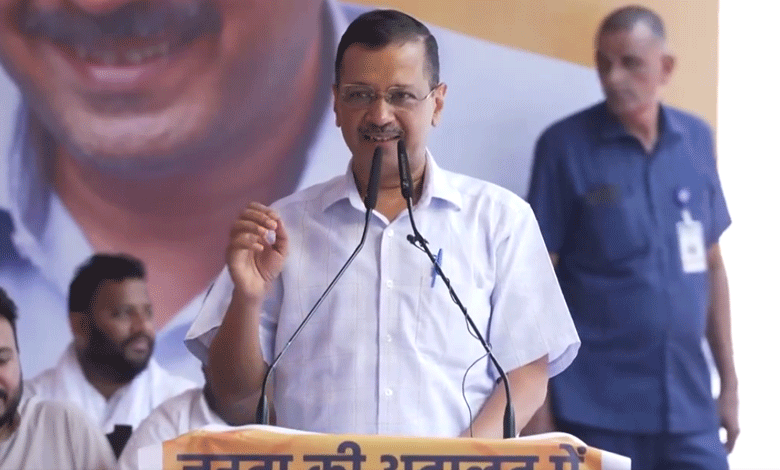Delhi BJP Criticizes Kejriwal’s Remarks on Purvanchalis, Promises to Teach a Lesson on February 5 Assembly Polls
The Delhi BJP condemns Arvind Kejriwal's comments on Purvanchali voters as "fake" and vows to teach a lesson in the February 5 Assembly elections, highlighting their key role in Delhi's political landscape.

New Delhi: The Delhi BJP has strongly condemned Arvind Kejriwal and his Aam Aadmi Party (AAP) for the remarks made about Purvanchali voters, labeling them as “fake.”
The BJP claims that Purvanchalis will “teach a lesson” to Kejriwal and his party in the upcoming February 5 Assembly elections.
Table of Contents
BJP Slams Kejriwal’s ‘Fake Voters’ Comment
The Delhi BJP took to social media, sharing a scathing poster on the platform X, which depicted Arvind Kejriwal as the “Jaani Dushman” (bitter enemy) of Purvanchalis.
The party voiced its anger over Kejriwal’s recent statement calling voters from Uttar Pradesh and Bihar “fake,” while contrasting them with Rohingyas and other infiltrators, whom Kejriwal reportedly embraces as “relatives.”
According to the Delhi BJP, the comment reflects Kejriwal’s prejudiced mindset and shows his disdain for Purvanchali voters who form a significant part of the electorate in Delhi.
Purvanchalis Make Up 42% of Delhi’s Voters
Purvanchalis, or migrants from Uttar Pradesh and Bihar, represent a significant voting bloc in Delhi, comprising 42 percent of the city’s 1.55 crore voters.
This demographic has a decisive influence on nearly half of Delhi’s 70 Assembly constituencies. Key constituencies with a high concentration of Purvanchali voters include Burari, Laxmi Nagar, and Dwarka.
The Delhi BJP’s poster highlights this demographic’s importance, stating that despite Kejriwal’s negative comments, the Purvanchali community will show their displeasure at the polls, ensuring AAP receives a political lesson on February 5.
Purvanchalis in Delhi: A Long-Standing Community
Purvanchali migrants have been a crucial part of Delhi’s cultural and social fabric for decades. The BJP is positioning itself to capitalize on the sentiment of this community, especially after Kejriwal’s controversial remarks.
During the COVID-19 pandemic, Kejriwal’s administration faced criticism for pushing out migrant workers, many of whom were Purvanchalis, from Delhi. BJP members point to these actions as part of a broader pattern of disrespect towards the community, further fueling the narrative that Kejriwal’s government has failed to address their needs.
Also Read | Rain in Delhi-NCR Brings Relief, AQI Improves to ‘Poor’
BJP Criticizes AAP’s Inaction on Key Issues
The BJP has also criticized Kejriwal for his administration’s failure to address long-standing issues such as the cleanliness of the Yamuna River. Despite promising during previous election campaigns to clean the river, Kejriwal’s government has been unable to deliver on these promises.
In particular, the lack of action on the Yamuna has had significant cultural implications, with women unable to perform the Chhath Puja rituals in the river, a key religious observance for Purvanchalis.
The Delhi BJP claims that Kejriwal’s broken promises on the Yamuna’s cleanliness and his treatment of Purvanchali voters show his lack of commitment to addressing the real concerns of the people.
Kejriwal Attempts Damage Control, Blames BJP
In response to the backlash following his remarks, Kejriwal attempted to walk back his statement by blaming the BJP for not delivering on promises of development for Purvanchalis.
However, this explanation has done little to quell the anger within the Purvanchali community. BJP leaders argue that Kejriwal’s damage control efforts are insufficient and only reveal the “dark truth” of his views.
The Road Ahead: February 5 Assembly Polls
With the Assembly elections just around the corner, the battle for Purvanchali votes is expected to be a critical factor in the outcome of the February 5 polls. The BJP is mobilizing this voter base, promising them a better future while taking on Kejriwal’s leadership.
The results of the election will be announced on February 8, with the BJP looking to make significant inroads into AAP’s dominance.
In the outgoing Assembly, AAP holds a majority with 62 seats, while the BJP has just eight. However, with Purvanchalis constituting a key electoral force, the BJP is confident that it can turn the tide in its favor.
